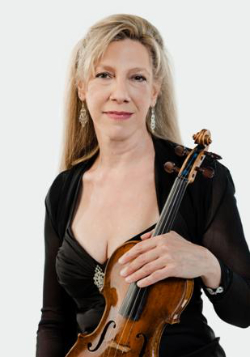
Courtesy of the Author
The Phoenix Symphony has a very extensive community outreach program, reaching not only thousands of children in the education programs, but also sending musicians out to homeless shelters, rehab centers, hospitals, and most recently, the Hospice of the Valley. The most recent addition to these amazing and powerful programs is a clinical study about the effects of live music on dementia and Alzheimer’s patients. It began as a study, but it became an invaluable life-changing experience.
To begin the study, a group of musicians from the symphony met with music therapists and experts from different health organizations, in collaboration with the Arizona State Univeristy (ASU) College of Nursing. In our first meeting we were asked, “Have any of you been directly affected by this disease?” Absolutely everyone raised their hands.
This is the profound truth about this devastating disease, and we were soon to learn the powerful and positive effects music could have as we embarked on this journey.
We have now completed two studies in collaboration with ASU, at two very different facilities for dementia and Alzheimer’s patients. The first one was for six weeks at a smaller, quite beautiful, care facility. There were only 48 patients housed in four “cottages” or houses, according to their level of function. The grounds were beautiful, with areas for the patients to walk and sit. The second one was at a large institution, where most of the patients are wheelchair bound, and many are rarely visited by family or friends. As different as these places were, the results were identical. The patients at both were profoundly affected by the musical encounters.
We went once a week for these sessions, in small groups, performing and interacting with the patients, and we were soon astonished by the results—seeing an unresponsive woman open her eyes for the first time in weeks, a Polish man asking for polkas, another unresponsive woman suddenly starting to sing “Amazing Grace” as we played. By the end of our time with these special people, it was very hard to say goodbye because we had grown to know them after so many weeks of personal interactions. These are memories for a lifetime.
The Phoenix Symphony began a new program this year with dementia and Alzheimer’s patients at the Hospice of the Valley, and although this program did not have the consistency of seeing the same patients, and developing relationships over a prolonged period of time, the single interventions with the hospice patients had the very same powerful results.
During the clinical studies we all had to take a saliva test before and after each session to measure the level of stress hormones. This was done by all four groups: the patients, the caregivers, the family members, and the musicians.
The results showed that everyone had lower stress levels after the sessions, and for the patients it would last—we were told that on the days of our interventions the patients were calmer all day, especially when they had to take showers or go through other stressful experiences.
With the goodwill created in the community, you can add the Phoenix Symphony to that list of groups made better off by this program, and it is a win/win situation all around.
The most important and meaningful result of these opportunities for us as musicians was the deeply beautiful human interaction. As difficult and emotional as some of the encounters were, it was an invaluable experience to be able to use our music to bring some peace and comfort to these special people. Powerful and positive.
Note: the Author is the Associate Concertmaster of the Phoenix Symphony. Further details of the project are available here.





